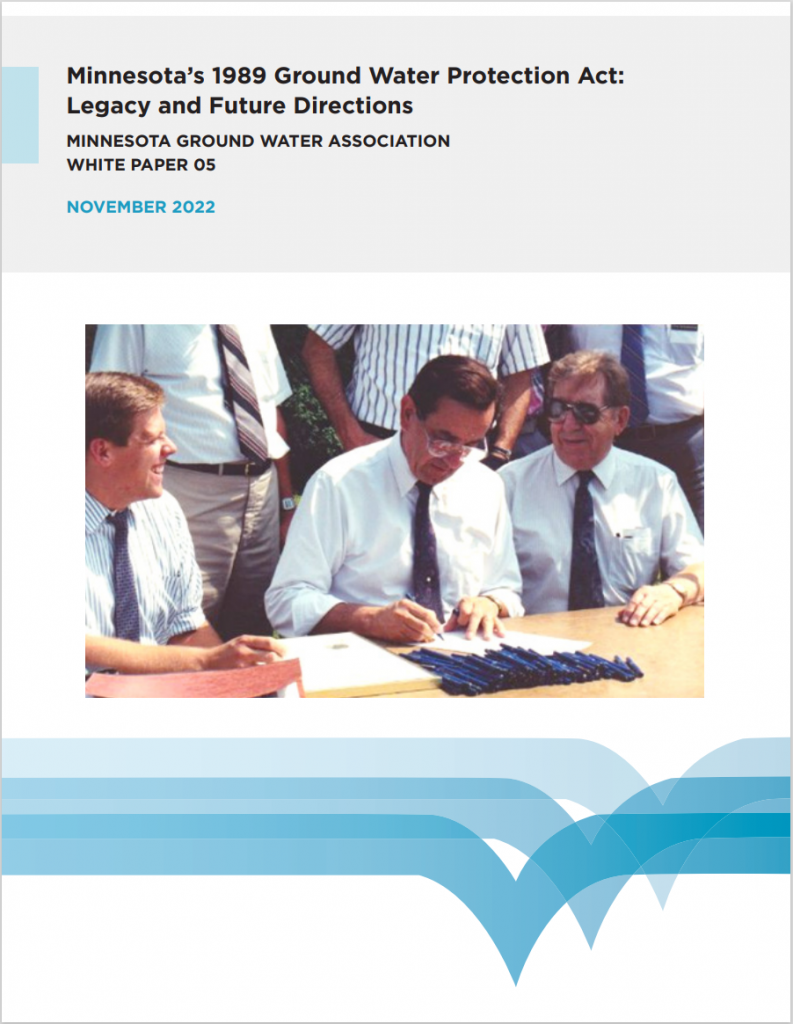
The White Paper team completed the fifth in a series of white papers for the MGWA. This latest paper focuses on the state’s Ground Water Protection Act. The full paper can be accessed on the MGWA website at: https://www.mgwa.org/white-papers/. The executive summary is reprinted below.
Executive Summary
Passing with broad bipartisan support, the 1989 Ground Water Protection Act established a framework for protecting Minnesota’s groundwater based on a comprehensive approach designed to prevent degradation of groundwater quantity and quality.
Much has changed in over thirty years since passage of this landmark environmental legislation. Groundwater demand has grown. Technology to detect and measure groundwater contaminants has improved, making clear that activities on the land surface affect groundwater quality. The effects of climate change on groundwater quantity and quality are becoming evident. Minnesota Statutes evolved since 1989 to place greater emphasis on groundwater stewardship by formalizing a definition of water sustainability. Funding mechanisms have changed such that funding shortages for important groundwater projects can be expected if the Clean Water Land & Legacy Amendment is not extended beyond the sunset date of 2034.
The existing and expected changes in water demand, technology and surveillance, climate, statute, and funding make groundwater protection in the 21st century more critical than ever. These factors trigger the need for this Minnesota Ground Water Association White Paper. Through the lens of groundwater sustainability, this White Paper advances a conversation
about needed priority policy and management actions, beyond those outlined in the Ground Water Protection Act of 1989. The priority actions are summarized in three main categories:
Ensured Stable Funding: Funding for critical groundwater activities must itself be sustainable for groundwater sustainability to be achieved. The Clean Water, Land & Legacy Amendment sunsets in 2034, creating a potential funding gap for critical groundwater activities.
Groundwater Sustainability: Minnesota contains a large volume of groundwater, yet groundwater sustainability is not assured. Sustainable groundwater management should be based upon water budgets, where thresholds leading to unacceptable effects are understood,
including those related to recharge, discharge, storage, aquatic habitats, and ecological conditions in streams. Minnesota Department of Natural Resources defined groundwater sustainability in statute; this definition could be made more useful through adoption of operational or practical definitions. Specific priority actions to promote groundwater sustainability include:
• Integrating groundwater sustainability assessments into water programs;
• Accounting for global climate change in groundwater sustainability assessments;
• Assuring public drinking water and groundwater sustainability;
• Assuring private drinking water supply and groundwater sustainability;
• Coordinating policy for land-use and groundwater sustainability
• Providing data and information for groundwater sustainability;
Minnesota’s 1989 Ground Water Protection Act 11
• Addressing inter-basin groundwater exports and groundwater sustainability;
• Addressing contaminants of emerging concern and groundwater sustainability;
• Promoting technical innovation and groundwater sustainability.
Water Governance: Recurring proposals to change the structure of Minnesota’s water governance may impede progress toward groundwater sustainability. Proactively meeting these concerns may prevent the creation of unnecessary obstacles to groundwater sustainability efforts.
The priority actions discussed above are opportunities to continue the work that originated from the Act, and address issues, ideas and approaches that have arisen in the meantime. Those invested in Minnesota’s groundwater resource should continue to unify policy and management efforts around the central unifying theme of groundwater sustainability. Sustained funding for activities described in this White Paper, and a unified approach to water
governance will both be critical to achieving and maintaining groundwater sustainability.
Thirty years after its passage, Minnesota groundwater professionals recognize the far-sighted impact that the Act has had on the management of Minnesota’s groundwater. Yet the Act has not accomplished everything intended. It did not address all critical risks to groundwater quantity or quality, nor did it provide a complete strategy for protecting Minnesota’s
groundwater. Minnesotans must continue to capture the critical measures to support the achievement of sustainable groundwater use and protection. One great accomplishment of the Act is that much of the work necessary for this next step is already done.
MGWA is committed to developing a just, equitable, and inclusive groundwater community. Click on the button below to read MGWA’s full diversity statement.